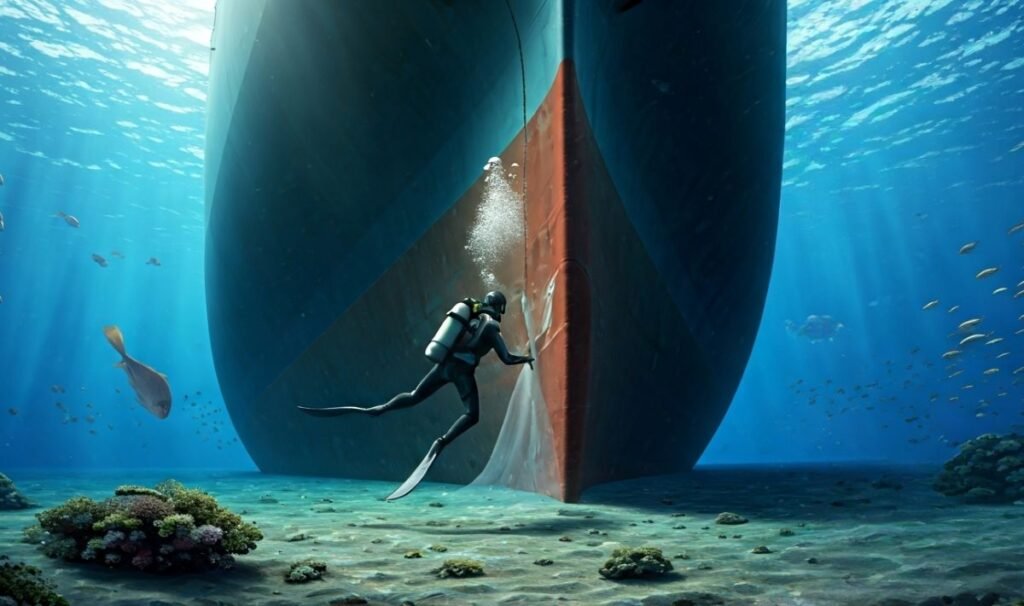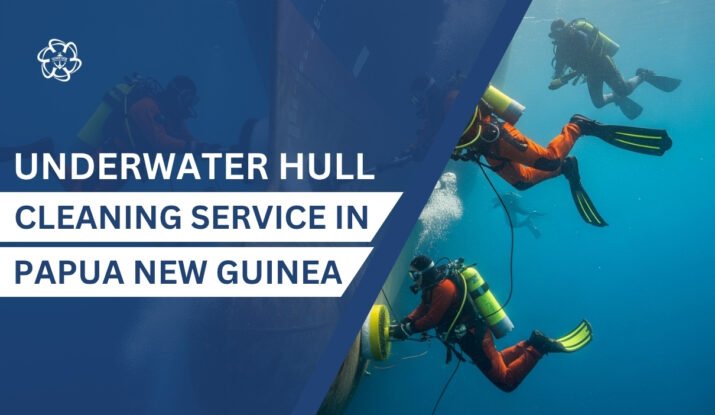Underwater hull cleaning in Papua New Guinea is vital for shipping companies in Papua New Guinea, as it removes marine growth like tube worms and barnacles to ensure smooth vessel operation.
This innovative solution minimizes downtime and lowers operational costs
Importance of Underwater Hull Cleaning in Papua New Guinea
Marine fouling is a common problem for ships in Papua New Guinea’s busy ports, where barnacles, weeds, and calcium accumulate on hulls, highlighting the extent of marine fouling. This buildup impacts a ship’s structure and performance, requiring regular cleaning.
These services are vital for maintaining ship condition, reducing fuel consumption, and enhancing operational performance. By offering local solutions, Papua New Guinea can become a leader in maritime maintenance services.
Impact on Vessel Performance and Fuel Efficiency Underwater Hull Cleaning in Papua New Guinea
Marine growth can slow vessels, increasing drag and fuel consumption. Hull cleaning smooths the ship’s exterior, reducing fuel costs.
Clients in Port Moresby benefit from quick local underwater hull cleaning in Papua New Guinea, avoiding trips to New Zealand or Australia, saving both time and fuel expenses.
Commercial Dive Manager Ricky Leka emphasizes that hull cleaning is a high risk service, highlighting their high-quality rotating brushes and suction machines for effective underwater hull cleaning in Papua New Guinea, ensuring cruise liners in Papua New Guinea operate efficiently while minimizing environmental impact, as the divers are in constant motion, utilizing their upper bodies to apply continuous force.
Environmental Considerations and Biofouling Regulations for Underwater Hull Cleaning in Papua New Guinea
Papua New Guinea enforces strict environmental regulations for hull cleaning, with the National Maritime Safety Authority and other regulatory authorities overseeing documentation and permits.
Hull build-up can impair performance and introduce invasive species, threatening the ecosystem.
They now use hydraulic techniques to effectively remove stubborn build-up without damaging ships, demonstrating their commitment to environmental stewardship in Papua New Guinea.
Methods and Technologies Used for Hull Cleaning

Hull cleaning technology in Papua New Guinea has advanced, with new improved technology making the process quick and efficient for a diversity of vessels and fouling conditions.
The team combines machines and manual methods tailored to each vessel’s needs. Engineers have adapted international tools for local use, ensuring consistent and eco-friendly results. This development benefits shipping companies in Port Moresby and beyond, providing reliable service and enhancing operational efficiency.
Safety Measures and Best Practices
Safety is paramount in hull cleaning at Cleanship.co The team employs stringent measures, led by a vigilant dive supervisor overseeing challenging underwater tasks, with standby divers and technical assistants ready for emergencies.
Best practices include:
- Divers rotate to prevent fatigue.
- Emphasis on proper force and motion for equipment stability.
- A dedicated dive supervisor monitors operations.
- Specialized vessels like the Wanilla are used for safer tasks.
- Advanced hydraulics technology for efficient job completion.
- Daily environmental care routines.
These practices underscore a commitment to excellence in hull cleaning, ensuring safety and effective execution through careful supervision, standby support, and disciplined habits.
Choosing a Reliable Hull Cleaning Service in Papua New Guinea
Choosing the right hull cleaning company is vital for success. The leading marine services provider offers tailored solutions and bespoke dive support vessel services for PNG. Their expert commercial dive team handles various tasks with care.
Partnering guarantees certified, safe cleaning services in Port Moresby that save you money. Their team keeps your vessel in top condition without long wait times or hidden fees, unlike some international providers.
Key Factors to Consider When Selecting a Provider
When choosing a hull cleaning service, shipping companies should consider these key factors, such factors as service duration:
- Service Duration: Ask about job duration, which can take 1 to 4 days based on vessel size, cleanliness, and load status.
- Technical Equipment: Ensure the company uses hydraulic precision tools that meet environmental regulations.
- Regulatory Compliance: Confirm adherence to local safety regulations and proper documentation.
- Proximity to Ports: Select a service conveniently located near major PNG ports, such as Port Moresby.
Choosing a reputable provider with skilled dive teams, like MarineSupercargo, can streamline operations and enhance reliability near key ports.
Certifications, Compliance, and Local Expertise
Certifications are vital as they show that a service provider meets industry standards. In PNG, verifying compliance with National Maritime Safety Authority regulations is essential.
International providers may lack local expertise, which can delay operations in PNG waters. Helping shipping clients save money and ensure safety.
General Manager Neil Papenfus highlights that tailored services build trust with shipping companies.
Conclusion
Hull cleaning in Papua New Guinea is a vital service crucial for vessel performance and environmental protection, as it can result in considerable improvements. Regular cleaning lowers fuel consumption, meets biofouling regulations, and extends vessel lifespan. Stay updated on the latest methods and select a reliable service to benefit your business and marine health. For enhanced efficiency and compliance, contact us to explore top hull cleaning options.
FAQ:
Q1. How often should hull cleaning be performed in Papua New Guinea?
Hull cleaning frequency depends on vessel size, load status, and marine growth. Cruise liners typically require cleaning every 6 to 12 months. Regular inspections help maintain performance and prevent potential issues.
Q2. Are there environmental regulations specific to hull cleaning in PNG?
Yes, PNG ensures all ships adhere to biofouling regulations monitored by the National Maritime Safety Authority. Companies conduct environmental testing and necessary checks to reduce the risk of biofouling to local waters.
Q3. What are the typical costs involved in underwater hull cleaning in Papua New Guinea?
Costs vary by hull size, service duration, and fouling levels. Underwater hull cleaning in Papua New Guinea, technology offers Papua New Guinea shipping companies a cost-effective alternative to dry dock services, allowing them to maintain a clean ship while saving additional money.
Q4. Can underwater hull cleaning in Papua New Guinea be performed at all ports in Papua New Guinea?
Most PNG ports, including Port Moresby, offer hull cleaning services. Upgraded dive support ships facilitate servicing larger vessels nationwide, improving access to essential assistance for the maritime industry.
Q5. How do I verify the credentials of an underwater hull cleaning in Papua New Guinea?
Verify certifications, compliance, and references from trusted sources. Partner with providers, led by General Manager Neil Papenfus from New Zealand, to ensure standards are met and services align with industry expectations.


